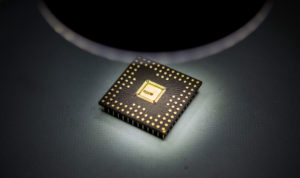Transforming and democratizing chip design. Engineering a reconfigurable computer. Improving wireless communication.

These are three of the five projects Michigan Engineering researchers have received more than $16.7 million to pursue through a Defense Advanced Research Projects Agency initiative to push microelectronics beyond Moore’s Law—the transistor scaling that has allowed for 50 years of rapid progress in electronics. DARPA’s Electronics Resurgence Initiative is a $75 million effort to jumpstart innovation in the field.
“The microelectronics community is facing an array of long foreseen obstacles to Moore’s Law,” according to DARPA. “Current economic, geopolitical, and physics-based complications make the future of the electronics industry uniquely interesting at this moment.”
The projects Michigan Engineering leads are:
An open-source hardware design tool: In a $6.5 million project that could revolutionize and democratize designing hardware devices, researchers will work to create an open-source hardware compiler. They aim to reduce the six-month process of hand-designing analog circuits to a dramatically faster and automated 24-hour routine. (Of the total funding $4.1 million remains at U-M.)
“The goal is to do for hardware what open-source compilers have done for software,” said David Wentzloff, associate professor of electrical and computer engineering and primary investigator on the project. “Someone could download a free suite of tools, specify the design of virtually any widget, and have that design produced in 24 hours without any knowledge of hardware.”
The project is titled Fully-Autonomous System on Chip (SoC) Synthesis using Customizable Cell-Based Synthesizable Analog Circuits. In addition to Wentzloff, this projects involves David Blaauw, Ronald Dreslinski, and Dennis Sylvester, all U-M professors of electrical engineering and computer science; Ben Calhoun, University of Virginia professor of electrical and computer engineering; and Arm Holdings, maker of ARM processors. Read more about this project.
A reconfigurable computer: Ron Dreslinski, assistant professor of computer science and engineering, leads a $9.5 million project to develop a computing system that allows software to adapt the hardware at runtime, making changes in processor interconnect speeds, connectivity, and arbitration policies. (Of the total funding, $5.8 million stays at U-M.) It would also allow the software to choose the correct ratio of processing elements to on-chip memory, and powergate the remaining processors to save power. The hardware can also be configured to support on-chip memory as a cache, scratchpad, or queue based allocation/replacement, Dreslinksi said.
The work has applications in image, video and text understanding, as well as analyzing sparse data.
“Current systems like GPUs offer a very efficient platform for regular workloads. . They, however, don’t perform well for workloads that are irregular,” Dreslinksi said. “To give an example of a use, imagine processing a graph of all the connections on Twitter. Most people are connected to a only small set of individuals, leading to a sparse dataset. If the hardware is configured to process the workload and suddenly starts processing Justin Bieber, the amount of density changes. (He has many more followers than I do.) The software can detect this imbalance and reconfigure the hardware to more effectively use the cache resources as the workload changed.”
Researchers from the University of Edinburgh, Arizona State University, and Arm are contributing. Read more about this project.
U-M researchers are co-investigators on three other projects:
A new hybrid chip that can change its own wiring: Hun-Seok Kim, assistant professor of electrical and computer engineering, will lead a $5.2 million sub-project to develop a new type of system-on-chip that combines the adaptability of general purpose processors with the efficiency of specialized processors, allowing for demanding applications such as highly intelligent wireless communication systems used in radar and swarms of autonomous devices. This is part of a $17 million project led by Arizona State University. The project is titled Domain-Focused Advanced Software-Reconfigurable Heterogeneous System on Chip. Read more about this project.
Testing next-generation hardware design tools: To fuel innovation among small teams and startups and allow them to design and produce complex chips with ease, U-M researchers will participate in a national program that aims to build free, open-source electronic design automation tools. The U-M team will act as internal design advisors on the project, named “OpenROAD (Foundations and Realization of Open and Accessible Design).” At U-M, the project is led by Dennis Sylvester, professor of electrical and computer engineering. U-M receives $1.6 million. Read more about this project.
An additional sub-project will be led at U-M by Scott Mahlke, professor of electrical and computer engineering. Details were not yet available.
Source: Nicole Casal Moore, University of Michigan




























































